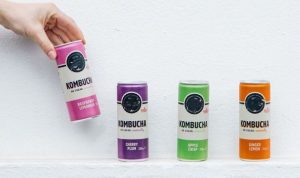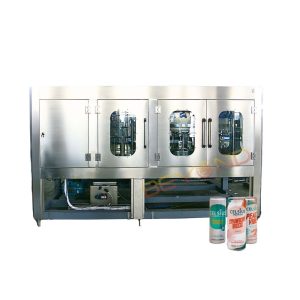1. What is Kombucha, and Why is It So Popular?
Kombucha is a fermented tea made by combining brewed tea, sugar, and a SCOBY (symbiotic culture of bacteria and yeast). During fermentation, natural acids and carbonation form, making it a tangy, probiotic-rich drink.
Why it’s trending: Consumers are seeking healthier, functional beverages. Kombucha fits this demand, especially in markets like North America and Europe, where it’s growing rapidly.
As a professional filling machine manufacturer, we aim to help producers understand the kombucha process and choose the right equipment.
2. Core Processing Flow of Kombucha Production
Basic Flow Overview:
Tea Brewing → Sugar Addition → Cooling → SCOBY Inoculation → Fermentation → Flavoring & Filtration → Filling → Pasteurization or Cold Storage
Key Process Highlights:
- Tea Brewing + Sugar Dissolution: Use stainless steel jacketed kettles with agitation. Control temperature (90–95°C) and steeping time to avoid bitterness.
- Cooling: Cool the sweet tea to 25–30°C using plate heat exchangers or jacketed tanks before adding SCOBY. Overheating can kill the culture.
- Fermentation: Ferment for 7–14 days in food-grade fermentation tanks. Ideal pH: 3.0–3.5. Temperature control (via jacketed tanks or controlled rooms) is essential.
- Filtration & Flavoring: After fermentation, kombucha is filtered and blended with juices or herbs. Filtration removes sediment and SCOBY strands.
- (Optional) Secondary Fermentation: Performed in sealed containers to build natural carbonation. Can be risky if uncontrolled (overpressure risk).

3. Why We Recommend Cans for Kombucha Packaging
1. Better for Carbonated Kombucha
Cans withstand internal pressure and are ideal for sparkling kombucha. The sealed aluminum structure maintains carbonation and reduces oxygen exposure.
2. Superior Shelf Stability
Aluminum cans protect from light and oxidation, extending shelf life and preserving flavor. Ideal for both pasteurized and cold chain products.
3. Excellent Consumer Experience
Cans are lightweight, easy to carry, and suitable for on-the-go consumption, making them perfect for retail channels like gyms, cafes, and supermarkets.
4. Efficient for Mass Production
Cans are compatible with high-speed automated filling lines, ensuring consistent output and lower production cost per unit.

4. Filling Machine Selection: Manufacturer’s Perspective
Recommended Filling Type: Isobaric Filling Machine
- Ideal for carbonated or pressure-sensitive liquids
- Prevents foaming and loss of CO2
- Ensures consistent fill level and hygiene
Key Equipment Configuration for Cans:
- Automatic Can Depalletizer or Can Feeder
- Rinsing Station (Air or Water Jet)
- Isobaric Filling + Seaming Monoblock
- Tunnel Pasteurizer or Cold Chain Integration
- Date Coding & Labeling System (optional)
- Automatic Case Packer / Palletizer (optional)
Hygiene & Material Standards:
- 316L stainless steel for all contact parts
- CIP & SIP (cleaning and sterilization in place)
- FDA/CE-compliant sanitary design
We offer full customization based on production capacity (3,000–12,000 CPH), plant layout, and bottle/can format.
5. Frequently Asked Questions (FAQ)
Q1: Will kombucha foam during filling?
Yes, especially if it is carbonated. That’s why we use isobaric filling to control pressure and minimize foam.
Q2: Will secondary fermentation cause cans to explode?
Yes, if not controlled. You must either pasteurize post-filling or ensure cold-chain storage to slow fermentation.
Q3: Can kombucha be sold at room temperature?
Yes, if pasteurized properly. Tunnel pasteurizers (e.g., 65°C for 20–30 min) are commonly used.
Q4: Will pasteurization kill all the probiotics?
Most live cultures will die, but beneficial acids, enzymes, and flavor compounds remain. Cold-chain live kombucha is also possible with the right logistics.
Q5: Are cans safe for kombucha? Will there be metallic taste?
Modern aluminum cans use BPA-free food-grade liners. No metallic taste if quality cans are used.
6. Conclusion: How We Help You Succeed in Kombucha Production
As a 20-year filling machine manufacturer, we help kombucha brands and startups with:
- Turnkey filling & packaging line design
- Equipment for tea preparation, fermentation, filtration, and filling
- Can-filling lines from 3,000–12,000 CPH
- Technical support, overseas installation, and training
We don’t just sell machines – we deliver end-to-end solutions for safe, scalable, and efficient kombucha production.
Contact us for a custom kombucha filling solution!
